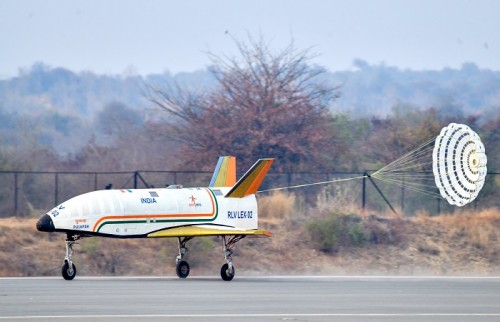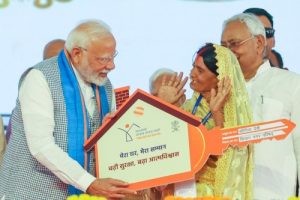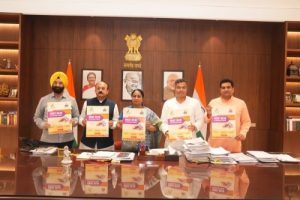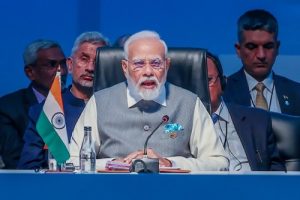India progressed further in its attempt to realise a reusable launch vehicle (RLV)/ rocket named ‘Pushpak’ by successfully test landing RLV LEX-2 on Friday at the Aeronautical Test Range (ATR) in Karnataka’s Chitradurga.
According to Indian Space Research Organisation (ISRO), the RLV LEX-2 demonstrated the autonomous landing capability from off-nominal initial conditions at the release from a helicopter.
The ‘Indian space shuttle’ the winged Pushpak was lifted by an Indian Air Force helicopter and was released from 4.5 km altitude.
Post release, Pushpak at a distance of 4 km on its own approached the runway along with cross-range corrections.
Pushpak landed precisely on the runway and came to a halt using its brake parachute landing gear brakes and nose wheel steering system, ISRO said.
For the second time ISRO successfully completed a test landing of its RLV.
“The mission successfully simulated the approach and high speed landing conditions of RLV returning from space. With this second mission, ISRO has revalidated its indigenously developed technologies in the areas of navigation, control systems, landing gear and deceleration systems essential for performing a high speed autonomous landing of a space returning vehicle,” the Indian space agency said.
ISRO had used the winged body and all flight systems that were used in RLV-LEX-01 test thereby validating the reuse capability of flight hardware and flight systems.
According to ISRO, the airframe structure and landing gear of RLV-LEX-01 was strengthened based on the first test landing.
The mission was achieved by ISRO’s Vikram Sarabhai Space Centre (VSSC) along with the Liquid Propulsion System Centre and the ISRO Inertial Systems Unit.
The Indian space agency collaborated with various other government agencies.
According to Dr. S. Unnikrishnan Nair, with the repeated success, ISRO could master the terminal phase maneuvering, landing and energy management in a fully autonomous mode, which is a critical step towards the future orbital re-entry missions.
The team was guided by Sunil P., Programme Director, Advanced Technology and Systems Programme, VSSC, J. Muthupandian, Project Director, RLV and the Mission Director and B. Karthik, Deputy Project Director, RLV and the Vehicle Director for the mission.

























Add Comment